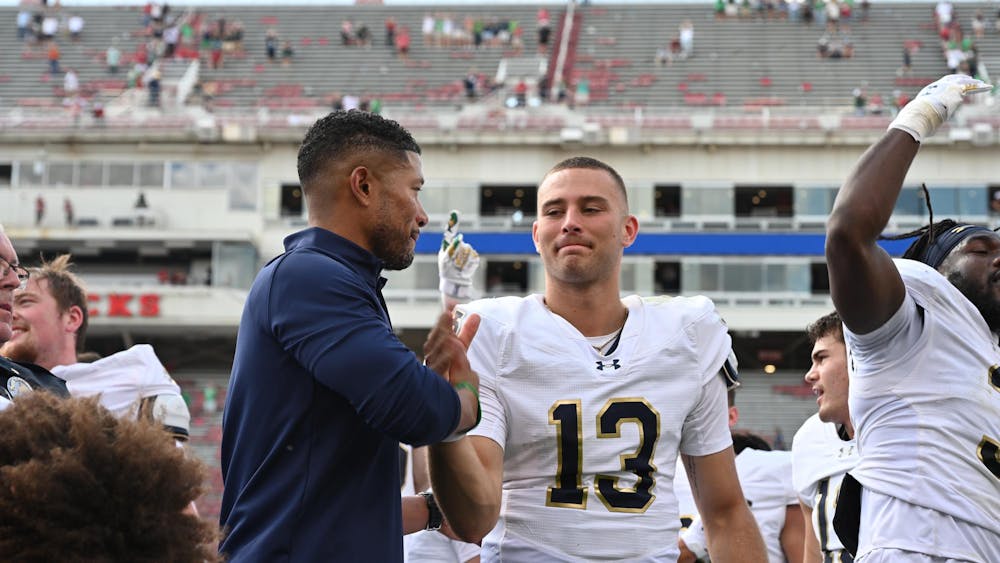Before fall break, Saint Mary’s Belles for Life club hosted the Planned Parenthood Project, a national initiative by Students for Life of America, on campus. In response, Feminists United club constructed a display of 1,852 flags, each of which represented 10 Planned Parenthood services not related to abortion or contraception. Several students responded by creating a petition on Change.org calling on College President Carol Ann Mooney to fulfill three requests: to prohibit any display supporting Planned Parenthood or any institution providing abortions, to prohibit faculty from distributing or encouraging distribution of pro-abortion paraphernalia and to release a formal, public statement reaffirming the College’s support for the pro-life mission of the Catholic Church.
This garnered a response from Vice President for Student Affairs Karen Johnson, who sent an email to students in which she said Saint Mary’s role as a Catholic college comes with a responsibility to maintain consistency with Catholic teachings. She clarified the College’s guidelines as applied to club events, which emphasize the difference between education versus advocacy and support. “Sponsorship of a speaker, in and of itself, does not constitute advocacy or support of ideas expressed by the speaker,” Johnson said.
A few days later, Mooney released a statement to students that said the College plays dual roles in education — which, at the undergraduate level, traditionally involves free access to information — and in the formation of young people in the Catholic tradition, which prohibits Saint Mary’s student groups from taking advocacy positions inconsistent with Church teaching.
Saint Mary’s, Notre Dame and Catholic universities around the country face this same issue often: How can we maintain our Catholic identity and continue to support intellectual freedom and an open exchange of ideas?
Too often, this question is posed in terms of finding a balance — a way to reconcile two otherwise incompatible ideas so neither side sacrifices too much. We contend, however, that intellectual freedom and open dialogue are essential aspects of the Catholic identity of an educational institution. Saint Mary’s and Notre Dame were built on the blended nature of these foundational concepts, that a true Catholic education encompasses access to and discussion of all ideas.
Notre Dame University President emeritus Fr. Ted Hesburgh, in his autobiography “God, Country, Notre Dame,” wrote about the role a Catholic university or college should play in not just the education, but also the formation of its students.
“The Catholic University should be a place where all the great questions are asked, where an exciting conversation is continually in progress, where the mind constantly grows as the values and powers of intelligence and wisdom are cherished and exercised in full freedom,” he wrote.
Great questions should explore difficult topics. Exciting conversations thrive with multiple viewpoints. A mind cannot grow without the exercise presented by a challenge, and Hesburgh envisioned a Catholic campus as one that actively promotes freedom and invites discussion of a wide range of ideas, no matter how controversial.
The University’s mission statement undoubtedly supports this harmony of Catholic education and intellectual freedom.
“As a Catholic university, one of its distinctive goals is to provide a forum where, through free inquiry and open discussion, the various lines of Catholic thought may intersect with all the forms of knowledge found in the arts, sciences, professions and every other area of human scholarship and creativity,” the statement reads. “ … What the University asks of all its scholars and students, however, is not a particular creedal affiliation, but a respect for the objectives of Notre Dame and a willingness to enter into the conversation that gives it life and character. Therefore, the University insists upon academic freedom that makes open discussion and inquiry possible.”
This, then, is how Notre Dame answers that question of Catholic identity and unfettered discussion: by affirming open and accessible debate as a primary goal of a Catholic educational institution. The University encourages the exploration of a diverse range of views framed within an environment supportive of faith-based decision-making. It is precisely the contention of opinion available within such an open framework that strengthens us as students and as members of this Catholic community.
Saint Mary’s mission statement and statement of philosophy and purpose also include the same dedication to intersectional identity and free thought.
“The College creates an open forum in which students freely and critically study the rich heritage of the Catholic tradition, raising the questions necessary to develop a mature religious life. … Engaging in all aspects of the college experience, students acquire the hallmarks of a liberally educated woman: keen self-knowledge, lively imagination, lifelong intellectual and cultural interests and the ability to make socially responsible choices about the future.”
Saint Mary’s invites students to critically study the Catholic tradition, a practice which involves examining both its merits and faults; this cannot be done without an understanding of opposing perspectives. Similarly, it promotes “the ability to make socially responsible choices,” a trait impossible without a holistic understanding of all available choices and beliefs — not just those endorsed by the Catholic Church.
While the foundation for the union of Catholic identity and intellectual freedom has been laid out in both schools’ mission statements, it has proven difficult to achieve in reality.
By allowing the Feminist United club’s controversial demonstration to take place on campus, Saint Mary’s was a step closer to living out its mission statement, supporting the critical development of its students’ responsible decision-making skills. In the backlash from the student petition, we only hope the College does not compromise on two concepts that should be a single goal.
The strength, knowledge and conviction of self resulting from free access to and discussion of all ideas at these Catholic institutions benefits all of us, whether we identify as Catholic or not. We encourage Saint Mary’s and Notre Dame to realize the full potential of their Catholic campuses and welcome oppositional discourse as a means of becoming the institutions of true formation and growth they were intended to be.
Observer Editorial: Embracing the dual role of Catholic education
The views expressed in this column are those of the author and not necessarily those of The Observer.









